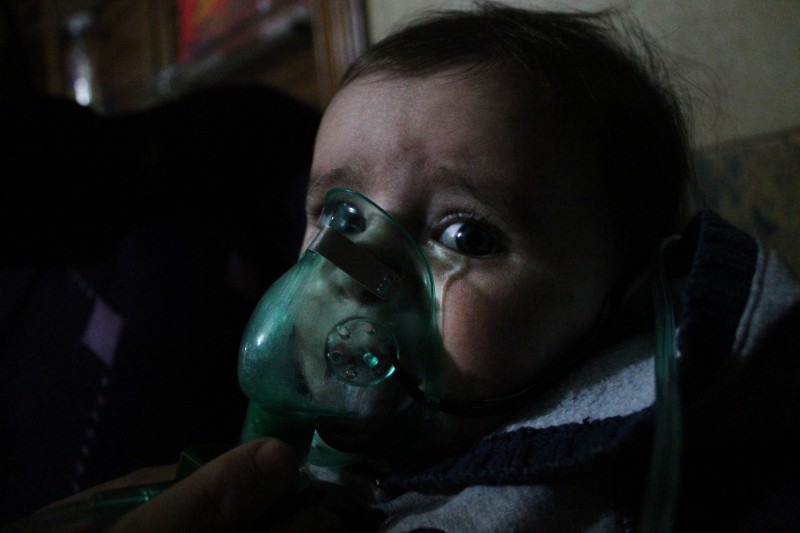This post is part of a special series of articles by blogger and activist, Marcell Shehwaro, describing the realities of life in Syria during the ongoing armed conflict between forces loyal to the current regime, and those seeking to oust it.

Life without electricity in Syria: Surgical teams now without water and electricity in Aleppo. Image by Halabi Lens. Copyright: Demotix
Since the part of Aleppo where I live was liberated from the Syrian government authorities, our electricity supply has been cut off as a collective punishment for a city on the verge of liberation. It doesn't matter whether you support or oppose the regime, because the ruler of the country behaves as if he is the owner of a farm, cutting off electricity and water supplies when he pleases. If he could cut out the supply of oxygen to those who oppose him, he probably would.
Our power supply has disappeared completely for long periods. We'd complain for a couple of days, or a week, then we'd have to turn our attention to burying the remains of the dead as the Assad killing machine switches from bombing the Damascus countryside to bombing the city, sometimes with Scud missiles.
At the same time, we have had to contend with new challenges emerging from the halt in state services such as health, education and the judicial system. It took us a long time to understand that the city we loved had in fact become two cities which rebuke each other, and try to outdo one another in the number of death announcements.
And we became accustomed. We got used to life as it must have been before the invention of the light bulb, resigned to the disappearance of this modern luxury. It became a customary to hear ululations of joy in the neighbourhood when the electricity was turned on, as if it was an exceptional event which called for celebration.
With time, the rituals of our life began to be measured by the quantity of electricity His Majesty bestowed upon us. We had to make the most of the two-hour electricity supply the lucky neighbourhoods received. We would switch on all the lights in the house, even those we did not need, and charge all our electrical gadgets, especially our laptops and mobile phones, even though these barely work, as the network is so weak.
If we were lucky and the reappearance of electricity coincided with the availability of water, we would start tackling the loads of laundry that had piled up. Many of us invested the two hours on using our electric ovens, to save on exorbitantly priced gas. Even the hours you sleep and wake up are no longer important. You have to get used to waking up when the electricity is switched on to complete those household chores that depend on having a power supply.
The availability of electricity also dictates what you buy and eat. There's no point in buying foodstuff that need refrigeration. You become innovative and find new places to store your goods. You might leave a piece of meat, which has become relatively expensive, near the window, because you cannot come to terms with the idea of throwing it out if it were to spoil. Any perishables you buy must be consumed within a day or two. With time, you learn to adjust and estimate the quantity of food you need. Or perhaps you never learn, like one of our friends who always misestimates the amount of labna we need for our household.
After several months, Syrians found innovative and economical solutions to replace the government-supplied electricity. Central electricity generators became available in most neighbourhoods in the liberated areas, and with their noise and pollution have become a feature of the city, which is already covered with soot from the bombings and Scud missiles.
Households share generators among themselves according to their needs, or, more precisely, their financial abilities. Little by little, you learn the names of the owners of the generators which supply your friends’ homes, as you can't help but hear their screaming as they and their neighbours yell across the balconies every time the electricity goes off, or when there's a problem with the supply. This happens four or five times daily: “Abu Ahmed, the electricity is off,” followed by, “Abu Ahmed, the electricity is back on.” Electricity from the generators is available for only a few hours daily, but it's become an acceptable alternative that allows people to take care of their basic needs.
The size of your handbag also expands to keep up with the unpredictable electricity supply. You have to carry all your chargers with you wherever you go, in order to take advantage of any moment the electricity is switched on. And if you have spare cash, you'll certainly buy an extra battery for your mobile phone and laptop.
Flickering lights, not strong enough to read by, cast their shadows on the walls of your house, powered by car batteries which Syrians also now use to generate electricity in their homes. In this modern age, you use a great deal of your brain power, and your time, to manage the absence of electricity, and this is what the evil dictator wants. He wants us to stop following the news, to become cut off from all that is happening around us. He wants to divide Syria so that we become focused on our own local and limited needs, which do not extend beyond the neighbourhood we live in. He wants us to become paralysed and exhausted from the lack of services. He wants to make our lives difficult in order for us to yearn for the good old days.
And we have to be resourceful, so that it lights up what is left of our journey.
Marcell Shehwaro blogs at marcellita.com and tweets at @Marcellita, both primarily in Arabic. You can read the first two posts in this series here and here.








8 comments
It’s time for an over throw people. That idiot president has to face justice in the Hague.
roughly translated to Thai here:
https://www.facebook.com/photo.php?fbid=10152385812113130&set=a.10150109699603130.289409.116319678129
That baby’s eyes are full of fear…and that’s not right.
May Allah be with you. You Syrians are going to be the strongest nation the world has ever seen.
The world is watching while Syria has lost its precious treasures, young generation.